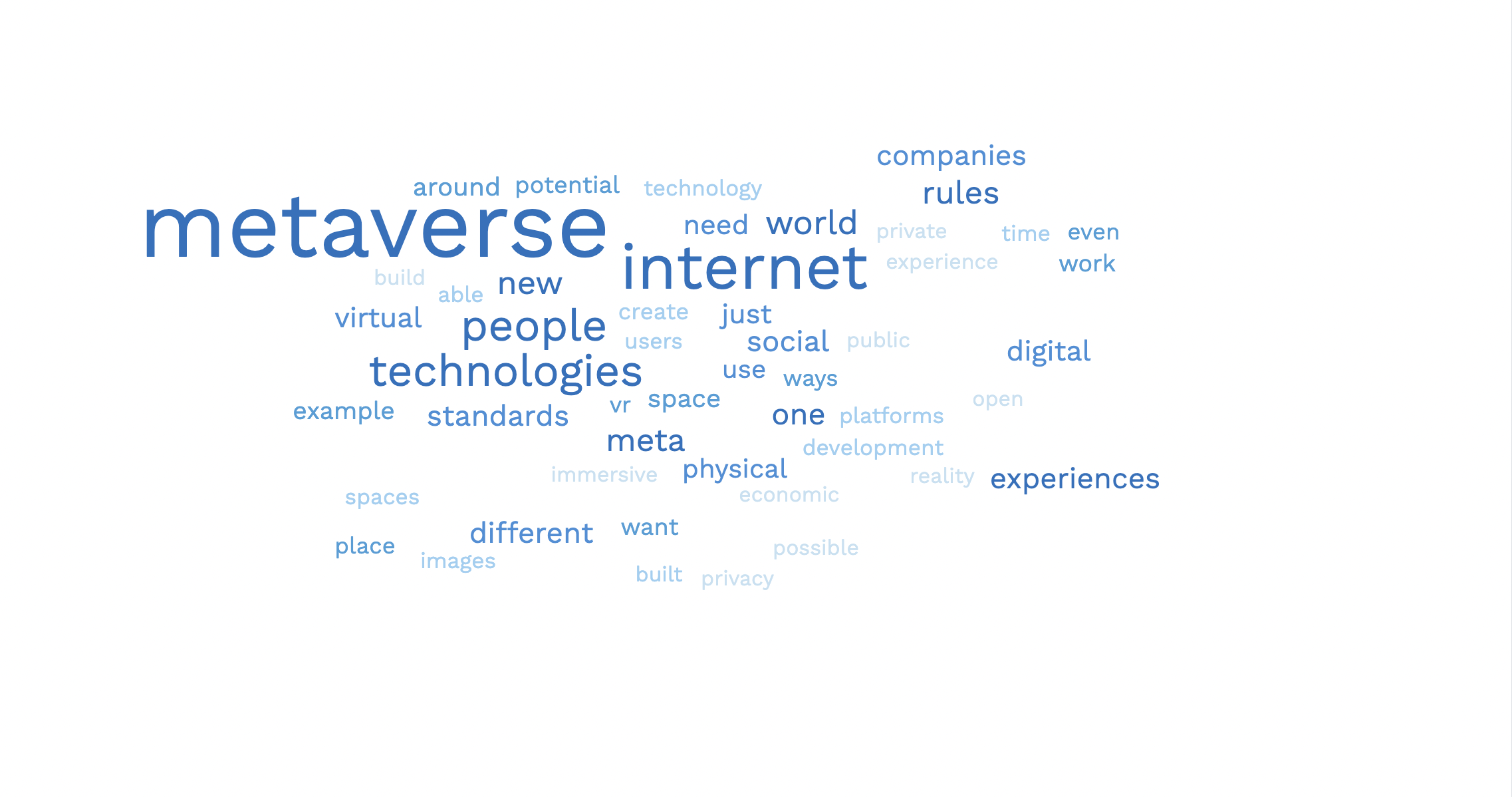Entertainment
We (skim)read Meta’s metaverse manifesto so you don’t have to…

Meta’s recently crowned president of global affairs, Nick Clegg — who, in a former life, was literally the deputy prime minister of the U.K. — has been earning his keep in California by penning an approximately 8,000-word manifesto to promo “the metaverse”: aka, the sci-fi-inspired vapourware the company we all know as Facebook fixed on for a major rebranding last fall.
Back then, founder and CEO Mark Zuckerberg, pronounced that the new entity (Meta) would be a “metaverse-first” company “from now on”. So it’s kinda funny that the key question Clegg says he’s addressing in his essay is “what is the metaverse” — and, basically, why should anyone care? But trying to explain such core logic is apparently keeping Meta’s metamates plenty busy.
The Medium post Clegg published yesterday warns readers it will require 32 minutes of their lives to take in. So few people may have cared to read it. As a Brit, I can assure you, no one should feel obliged to submit to 32 minutes of Nick Clegg — especially not bloviating at his employer’s behest. So TechCrunch took that bullet for the team and read (ok, skim-read) the screed so you don’t have to.
What follows is our bullet-pointed digest of Clegg’s metaverse manifesto. But first we invite you to chew over this WordCloud (below), which condenses his ~7,900-word essay down to 50 — most boldly featuring the word “metaverse” orbiting “internet”, thereby grounding the essay firmly in our existing digital ecosystem.
Glad we could jettison a few thousand words to arrive at that first base. But, wait, there’s more!

Image Credits: Natasha Lomas/TechCrunch
Fun found word pairs that leap out of the CleggCloud include “companies rules” (not democratic rules then Clegg?); “people technologies” (possibly just an oxymoron; but we’re open to the possibility that it’s a euphemistic catch-all for ill-fated startups like HBO’s Silicon Valley‘s (satirical) ‘Human Heater’); “around potential” (not actual potential then?); “meta physical” (we lol’d); and — squint or you’ll miss it! — “privacy possible” (or possibly “possible privacy”).
The extremely faint ink for that latter pairing adds a fitting layer of additional uncertainty that life in the Zuckerberg-Clegg metaverse will be anything other than truly horrific for privacy. (Keen eyed readers may feel obligated to point out that the CleggCloud also contains “private experience” as another exceptionally faint pairing. Albeit, having inhaled the full Clegg screed, we can confirm he’s envisaging “private experience” in exceptional, siloed, close-friend spaces — not that the entire metaverse will be a paradise for human privacy. Lol!)
Before we move on to the digest, we feel it’s also worth noting a couple of words that aren’t used in Clegg’s essay — and so can only be ‘invisibly inked’ on our wordcloud (much like a tracking pixel) — deserving a mention by merit of their omission: Namely, “tracking” and “profiling”; aka, how advertising giant Meta makes its money now. Because, we must assume, tracking and profiling is how Meta plans to make its money in the mixed reality future Clegg is trying to flog.
His essay doesn’t spare any words on how Meta plans to monetize its cash-burning ‘pivot’ or reconfigure the current “we sell ads” business model in the theoretical, mixed reality future scenario he’s sketching, where the digital commerce playground is comprised of a mesh of interconnecting services owned and operated by scores of different/competing companies.
But perhaps — and we’re speculating wildly here — Meta is envisaging being able to supplement selling surveillance-targeted ads by collecting display-rents from the cottage industry of “creators” Clegg & co. hope will spring up to serve these spaces by making digital items to sell users, such as virtual threads for their avatars, or virtual fitting rooms to buy real threads… (‘That’s a nice ‘Bored Ape T-Shirt’ you’re planning to sell — great job! — but if you want metamates to be able to see it in full glorious color you’ll want to pay our advanced display fees’, type thing. Just a thought!)
Now onwards to our digest of Clegg’s screed — which we’ve filleted into a series of bulleted assertions/suggestions being made by the Meta president (adding our commentary alongside in bold-italics). Enjoy how much time we’ve saved you.
- There won’t be ‘a’ or ‘the metaverse’, in the sense of a single experience/owned entity; there will be “metaverse spaces” across different devices, which may — or may not — interoperate nicely [so it’s a giant rebranding exercise of existing techs like VR, AR, social gaming etc?]
- But the grand vision is “a universal, virtual layer that everyone can experience on top of today’s physical world” [aka total intermediation of human interaction and the complete destruction of privacy and intimacy in service of creating limitless, real-time commercial opportunities and enhanced data capture]
- Metaverse spaces will over index on ephemerality, embodiment and immersion and be more likely to centre speech-based communication vs current social apps, which suggests users may act more candid and/or forget they’re not actually alone with their buddies [so Meta and any other mega corporates providing “metaverse spaces” can listen in to less guarded digital chatter and analyze avatar and/or actual body language to derive richer emotional profiles for selling stuff]
- The metaverse could be useful for education and training [despite the essay’s headline claim to answer “why it matters”, Clegg doesn’t actually make much of a case for the point of the metaverse or why anyone would actually want to fritter their time away in a heavily surveilled virtual shopping mall — but he includes some vague suggestions it’ll be useful for things like education or healthcare training. At one one point he enthuses that the metaverse will “make learning more active” — which implies he was hiding under a rock during pandemic school shutdowns. He also suggests metaverse tech will remove limits on learning related to geographical location — to which one might respond have you heard of books? Or the Internet? etc]
- The metaverse will create new digital divides — given those who can afford the best hardware will get the most immersive experience [not a very equally distributed future then is it Clegg?]
- It’s anyone’s guess how much money the metaverse might generate — or how many jobs it could create! [🤷]
- But! Staggeringly vast amounts of labor will be required to sustain these interconnected metaverse spaces [i.e. to maintain any kind of suspension of disbelief that it’s worth the time sink and to prevent them from being flooded with toxicity]
- Developers especially there will be so much work for you!!! [developers, developers, developers!]
- Unlike Facebook, there won’t be one set of rules for the metaverse — it’s going to be a patchwork of ToS [aka, it’ll be a confusing mess. Plus governments/states may also be doing some of the rule-making via regulation]
- A lack of interoperability/playing nice between any commercial entities that build “metaverse experiences” could fatally fragment the seamless connectivity Meta is so keen on [seems inevitable tbh; thereby threatening the entire Meta rebranding project. Immersive walled gardens anyone?]
- Meta’s metaverse might let you create temporary, siloed private spaces where you can talk with friends [but only in the same siloed way that FB Messenger offers E2EE via “Secret Conversations” — i.e. surveillance remains Meta’s overarching rule]
- Bad metaverse experiences will probably be even more horrible than 2D-based cyberbullying etc [yep, virtual sexual assault is already a thing]
- There are big challenges and uncertainties ahead for Meta [no shit]
- It’s going to take at least 10-15 years for anything resembling Meta’s idea of connected metaverse/s to be built [Clegg actually specified: “if not longer”; imagine entire decades of Zuckerberg-Clegg!]
- Meta hopes to work with all sorts of stakeholders as it develops metaverse technologies [aka, it needs massive buy-in if there’s to be a snowflake’s chance in hell of pulling off this rebranding pivot and not just sinking billions into a metaverse money-hole]
- Meta names a few “priority areas” it says are guiding its metaverse development — topped by “economic opportunity” [just think of all those developer/creator jobs again! Just don’t forget who’s making the mega profits right now… All four listed priorities offer more PR soundbite than substance. For example, on “privacy” — another of Meta’s stated priorities — Clegg writes: “how we can build meaningful transparency and control into our products”. Which is a truly rhetorical ask from the former politician, since Facebook does not give users meaningful control over their privacy now — so we must assume Meta is planning a future of more of the same old abusive manipulations and dark patterns so it can extract as much of people’s data as it can get away with… Ditto “safety & integrity” and “equity & inclusion” under the current FB playbook.]
- “The metaverse is coming, one way or another” [Clegg’s concluding remark comes across as more of a threat than bold futuregazing. Either way, it certainly augurs Meta burning A LOT more money on this circus]
-

 Entertainment6 days ago
Entertainment6 days agoWhat’s new to streaming this week? (Jan. 17, 2025)
-

 Entertainment6 days ago
Entertainment6 days agoExplainer: Age-verification bills for porn and social media
-

 Entertainment5 days ago
Entertainment5 days agoIf TikTok is banned in the U.S., this is what it will look like for everyone else
-

 Entertainment5 days ago
Entertainment5 days ago‘Night Call’ review: A bad day on the job makes for a superb action movie
-

 Entertainment5 days ago
Entertainment5 days agoHow ‘Grand Theft Hamlet’ evolved from lockdown escape to Shakespearean success
-

 Entertainment5 days ago
Entertainment5 days ago‘September 5’ review: a blinkered, noncommittal thriller about an Olympic hostage crisis
-

 Entertainment5 days ago
Entertainment5 days ago‘Back in Action’ review: Cameron Diaz and Jamie Foxx team up for Gen X action-comedy
-

 Entertainment5 days ago
Entertainment5 days ago‘One of Them Days’ review: Keke Palmer and SZA are friendship goals




















